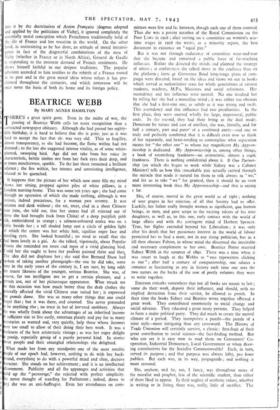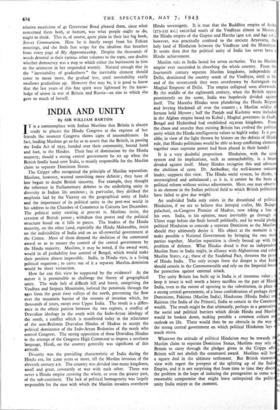BEATRICE WEBB
By MARY AGNES HAMILTON
T HERE'S a great spirit gone. Even in the midst of war, the .1 passing of Beatrice Webb calls for more recognition than a e contracted newspaper obituary. Although she had passed her eighty- e fifth birthday, it is hard to believe that she is gone, just as it was I hard to accept the fact that she. was very old. Thin to fragility,
e almost transparency, as she had become, the flame within had not dimmed ; to the last she suggested intense vitality, as of some white- s plumed, swooping bird. Age did not take from her voice its r characteristic, brittle timbre nor from her dark eyes their deep, and e at times mischievous, sparkle. To the last there remained a brilliant e salience ; the fire within, her intense and unresisting intelligence, refused .to be quenched.
It happens that the picture of her which now most fills my mind shows her sitting, propped against piles of white pillows, in a London nursing-home. This was some ten years ago ; she had come through an operation of which she made nothing, although it was serious, indeed precarious, for a woman past seventy. It was utumn and dusk without ; she sat, erect, clad in a short Chinese
n coat (one, she told me, that her sisters had all rejected out of I ose she had brought back from China) of a deep purplish pink ilk, embroidered in orange ; a salmon-coloured azalea was on a it table beside her ; a tall shaded lamp cast a circle of golden light which the centre was her white hair, aquiline eager face and azzling eyes. She looked beautiful ; no need to recall that she ad been lovely as a girl. As she talked, vigorously, about Popular y i ronts she reminded me more snd more of a vivid glancing bird. o told her she ought to have her porlsait painted there and then. e idea did not displease her ; she said that Bernard Shaw had .poken of taking another photograph—the one he did take, some a e in the early years of the century is, I am sure, by long odds se truest likeness of the younger, serious Beatrice. She was, of 3nurse, far too intelligent not to get a certain pleasure, and a s ertain use, out of her picturesque appearance. What struck me this occasion was how much better than the drab clothes she enerally affected the vivid Chinese coat suited her ; it expressed he grande dame. She was so many other things that one could orget that ; but it was there, and counted. She never pretended be anything else ; no trace in her of inverted snobbery. Always he was wholly frank about the advantages of an inherited income f sufficient size to live easily, entertain plainly and pay for as many cretaries as wanted and, very quietly, help those whose incomes ere too small to allow of their doing their best work. It was a ankness of the best aristocratic vintage ; as was her eager delight gossip, especially gossip of a purely personal kind. In stories bout people and their entangled relationships she delighted.
What made her from any standpoint one of the most notable ple of our epoch had, however, nothing to do with her back- ound, everything to do with a powerful mind and clear, decisive
• aracter. She stands on her achievement ; and it is an intellectual
ievement. Publicity and all ffie appanages and activities that ild up the " personage," she rejected with perfect simplicity. e never thought of standing for Parliament ; indeed, down to is she was an anti-Suffragist. Even her attendances on corn-
mittees were few and fair between, though each one of them counted. Thus she was a potent member of the Royal Commission on the Poor Laws in 1908 ; after serving on a committee on women's war- time wages in 1918 she wrote, as a minority report, the best document in existence on " equal pay."
But it was not through endurance of committee wear-and-tear that she became and remained a public force of far-reaching influence. Rather she directed the minds cnd planned the strategy of others ; at conferences she talked More in the coulisses than on the platform ; front 41 Grosvenor Road long-range plans of cam- paign were directed, based on the ideas and views set out in books which served as authoritative texts for whole generations of earnest students, teachers, M.P.s, Ministers and social reformers. Her ascendency and her influence were mental. No one insulted her by telling her she had a masculine mind ; it was rather too obvious that she had a first-rate one, as subtle as it was strong and swift. This ascendency and this influence had two peculiarities. In the first place, they were exerted wholly for large, impersonal, public ends. In the second, they had their being in the dual mode. Dominant by nature and cast of intellect, she was, literally, and for half a century, part and parce' of a combined entity—and one so truly and perfectly combined that it is difficult even now to think of her separately, and heart-rending to contemplate what separation means for " the other one " to whom her magnificent My Appren- ticeship is dedicated. My Apprenticeship is, among other things, a book of astonishing frankness—an aristocratic, almost a regal, frankness. There is nothing confidential about it. If Our Partner- ship (on which she began to work while Sidney was a Cabinet Minister) tells us how this remarkable pail actually carried through the miracle that made it natural lot them to talk always in " we," and for us to take " we " for granted, then it should be an even more interesting book than My Apprenticeship—and that is saying a lot.
She, of course, moved in the great world as of right ; nothing of sour grapes in her rejection of all that Society had to offer. Luckily, her father really thought women as significant, qua human beings, as men, and gave scope to the varying talents of his nine daughters, as well as, to this one, early contact with the world of large affairs and with the astringent mind of Herbert Spencer. True, her flights extended beyond his Liberalism ; it was only after his death that her passionate interest in the world of labour permitted her to find a mate, not in any rising politician, but in a till then obscure Fabian, in whose mind she discerned the inevitable and necessary complement to her own. Beatrice Potter married Sidney Webb in the summer of 1892. There was a time when it was smart to laugh at the Webbs as " two typewriters clicking as one " ; after half a century of companionship, one salutes a romance as fascinating as any in history each time one sees the two names on the backs of the row of portly volumes they were to write together.
Emerson remarks somewhere that not all books are meant to last ; some do their work, deposit their influence, and should, with no implied detraction from their service, be allowed to perish. In their time the books Sidney and Beatrice wrote together effected a great work. They contributed enormously to social change and social advance. They educated a great many persons. They helped to form a major political party. They did much to create the mental climate of a period. They incorporate a puzzle—the puzzle of a joint style—more intriguing than any crossword. The History of Trade Unionism will certainly survive, a classic: first-fruit of their great contribution to social science—the fact-finding method. But who can say it is easy now to read them on Consumers' Co- operation, Industrial Democracy, Local Government or when draw- ing constitutions for the Socialist Commonwealth? Each, in turn, served its purpose ; and that purpose was always lofty, pro bond publico. But each was, in its way, propaganda ; and nothing is more seasonal.
She, anyhow, and he, too, I fancy, was throughout more of the moralist and prophet, less of the scientific student, than either
of them liked to appear. In their neglect of aesthetic values, whether in writing or in living, there was, really, little of sacrifice. The relative asceticism of 41 Grosvenor Road pleased them, since what concerned them both, at bottom, was what people ought to do, ought to think. This is, of course, quite plain in their last big book, Soviet Communism. Here he is finally swept from his Fabian moorings, and she finds free scope for the idealism that breathes from every page of My Apprenticeship. Despite the thousands of words devoted in their various other volumes to the topic, one doubts whether democracy was a stop to which either the bureaucrat in him or the aristocrat in her responded warmly. Natural enough that in the "inevitability of gradualness" the inevitable element should come to mean more, the gradual less, until inevitability easily swallows gradualism up. However that may be, it is good to know that the last years of this fine spirit were lightened by the know- ledge of union in war of Britain and Russia—an aim to which she gave so much of herself.



























 Previous page
Previous page